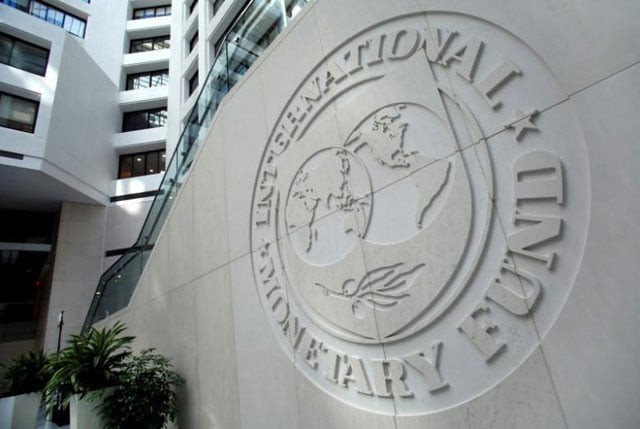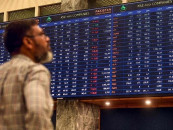As much as one hates it, IMF borrowing isn’t a bad deal
Need to go back comes after failures of the govt to address economic woes.

PHOTO: Reuters
This statistic is indeed quite worrisome, and rightly so. Analysts are commenting that Pakistan might soon have to undertake another loan from the IMF. This article argues that if borrowing must be undertaken then under those circumstances, approaching the IMF would not be a bad option.
First off, the IMF is not a country or such a sort of entity, borrowing from which tarnishes our national sovereignty. It is an international organisation, of which Pakistan too, is a member. Pakistan is represented on the board of governors of the IMF by the governor of the State Bank of Pakistan. Pakistan also has its representation on the Executive Board and has voting rights.
Second, borrowing from the IMF is cheaper for Pakistan compared to the other alternatives available to the country to finance its Balance of Payments deficit. The adjusted rate of charge, which is the interest rate charged for borrowing from IMF, is at 1.589, as of October 19, 2017. Now compare this with the coupon rate of 7% on Pakistan’s Investment Bonds.
IMF says Pakistan can manage without its support
The savings realised by countries undertaking an IMF loan programme are not just due to borrowing at lower rate from the IMF alone. Total savings due to lower ret of interest may actually be larger as often the overall commercial borrowing costs are lowered because of the adoption of an IMF program. The IMF is able to charge relatively low rates because of its cheaper funding and its ability to reduce risks. The unique financial structure of the IMF, drawing on surplus official reserves of financially strong member countries, ensures that IMF credit can be provided at relatively low cost.
Critics often say that IMF places certain conditions on its debtors. It is not alone in providing debt subject to some conditions. In February this year, Pakistan had implemented 10 conditions to seek a $300 million World Bank loan. One has to realise that beggars cannot be choosers. It is never the IMF that solicits Pakistan to borrow. The decision to borrow is taken by the government. Furthermore, the conditions by the IMF are negotiable and the government does not necessarily have to fulfill all of them.
If analysed, the IMF policy recommendations do not sound as ridiculous. For example, the IMF calls for privatisation of loss making State Owned Enterprises (SOEs). Reduction in losses of SOEs and carrying out privatization are two such things which are also included in the PML-N’s economic agenda. The losses of PIA, Pakistan Steel Mills, and Railways have surged to Rs705 billion in three years. No sensible policy maker needs the IMF to point it out that these enterprises are draining precious public finances and need to be ridden off as soon as possible.
Pakistan’s circular debt is hovering around Rs401 billion. If we undertake another borrowing program under the IMF, this time around, one condition of the loan can be expected to be the effective implementation of targets set for curtailing the transmission and distribution losses by the DISCOs. IMF or no IMF, this is one initiative that the government should itself undertake to check the growing circular debt.
In its latest Article VI report, the IMF states that there is a need to rebalance the federal-provincial fiscal relations. If IMF imposes this as a condition on Pakistan, this would a boon for the provinces. Last month, the K-P government called a meeting of all provinces in Islamabad to join and devise a strategy to push the federal government for announcing a new NFC Award. The provincial representatives announced that they are considering approaching the Supreme Court against the federal government for constitutional violation over delay in announcement of 9th NFC Award.
IMF data bloats Pakistan forex reserves by $3bn
Korea, Brazil, and Russia, to name a few, are among those who have borrowed from the IMF and have successfully reformed their economy. So the presence of success examples demonstrates that the IMF loan programs themselves are not to be denounced. What determines the loan programs’ utility is how the governments utilise the program to reform their policies. A by-product of IMF loans is the access to the expertise and advisory services of the fund’s economists and analysts. The sort of advisory services that the IMF team provides are often sought by the governments from renowned consultancy firms by paying them huge sums of money as consultancy fee.
Having to revert back to the IMF, time and again, is surely undesirable. The program should ideally be used as a stepping stone towards achieving economic reform.
Levying regulatory duties on imports is only an ad-hoc measure and it will serve a measure to boost smuggling in the country. Besides that, it is not expected to bring any significant dent in our import bill.
If things don’t change for better, sooner or later, debt will have to be resorted to. And if that is a given, the IMF is not a bad option.
The writer is a research associate at the Policy Research Institute of Market Economy
Published in The Express Tribune, October 23rd, 2017.
Like Business on Facebook, follow @TribuneBiz on Twitter to stay informed and join in the conversation.



















COMMENTS
Comments are moderated and generally will be posted if they are on-topic and not abusive.
For more information, please see our Comments FAQ